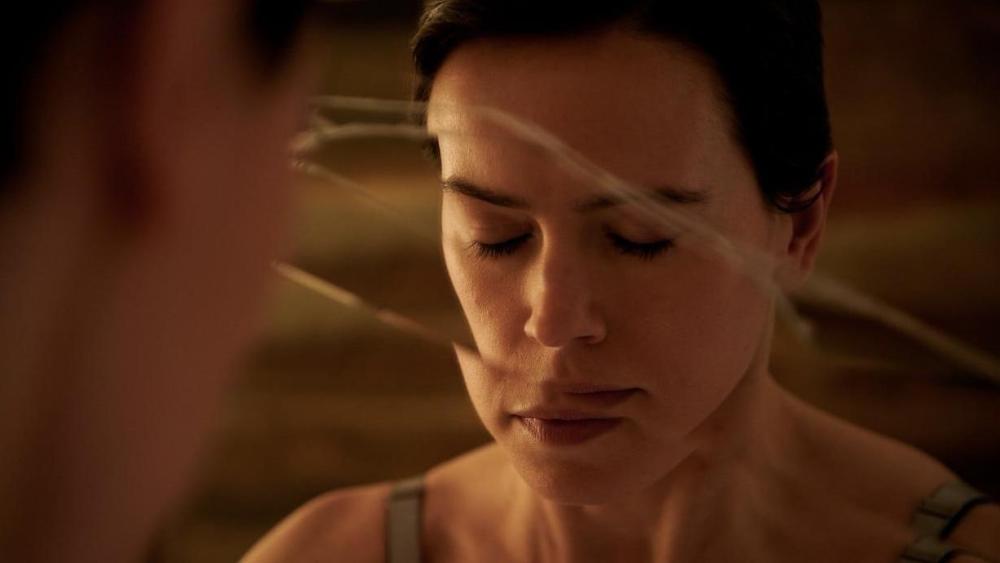How distraught is Annette, the deeply troubled British mother of two played by Daisy Ridley in Magpie? She has a short, angular haircut that in another context might be the height of chic (very Isabella Rossellini). Except the movie uses it as a symbolic representation of her trauma, like Mia Farrow’s iconic Vidal Sassoon cut in Rosemary’s Baby. Annette, who is on serious medication, stares in her mirror until she breaks. Does she have telekinesis? No, she broke it with her hands (blood ran into the sink), but the power of her suppressed anger is palpable. Her British-Indian husband Ben (Shazad Latif) is a prominent writer, and any comments she makes about his work are insidious. She speaks short, clipped “civilized” phrases. One day, a bird crashed into her window. The entire atmosphere of the movie is filled with her cold anger.
Annette suffers from a serious illness, but it is not a disease. It’s the blues that overwhelms her, as she feels like a mother raising a young child feels lonely, isolated, and abandoned. Ben, after all, had committed original sin. And it was simply this. After her son Lucas was born, he spent months going through her books, unaware of how much Annette needed him. He put all the blame on her, but when he returned, she was never the same as she was before.
The complex, even traumatic undercurrents that some mothers experience aren’t just good movie material. It’s long overdue. But “Magpie” presents Annette to the audience in a way that seems pretty extreme, and the whole movie is like that. Most of us wouldn’t blink an eye at cinematic real estate porn, but the house Annette and Ben own in the countryside outside of London is as big and spacious as a museum. When Annette goes to lunch with her former co-worker, the formality of their relationship and Lucas’ crying in the restaurant add to the awkwardness of every moment. And then the plot begins to move. Annette and Ben’s daughter, Matilda (Hiba Ahmed), who is about eight years old, is cast in a big-budget costumed drama, playing the role of the main character’s daughter. Alicia (Matilda Lutz) is an attractive Italian movie star.
Ben is Matilda’s chaperone on set, and from the first moment you can tell there’s a connection between him and Alicia (a much stronger connection than he appears to have with his wife). . In case you missed the point, a tabloid website has posted paparazzi shots of the two, asking who Alicia’s new “mystery man” is… and it’s only day two of filming . While much of “Magpie” is overstated, it also feels understated. It’s nice that the movie shows Ben intrigued by Alicia’s celebrity sex tape. But is it really necessary to drive home the point by having him masturbate in the shower or letting Annette hear his voice through the door? The film is going for a dark indie “Fatal Attraction” vibe, as Ben and Alicia begin to fall in love with each other. And my thought is that “Fatal Attraction” was more subtle.
But as “Magpie” progresses, something interesting happens. You begin to settle into the film’s overly telegraphed style, a mix of obviousness and mystery. You accept that this is not Hitchcock, or even Adrian Lyne. First-time director Sam Yates, working from a practical screenplay by Tom Bateman, values atmosphere, but there’s a primitive condemnation of the film’s no-frills presentation. I want to see what happens next. And Daisy Ridley, on whom the idea for this movie was based, knows exactly what she’s doing. She intentionally plays Annette as fragile and “unreasonable,” because that’s just how men like Ben see her. He doesn’t realize he has a problem. He is ignorant of his rights, of what his mother is actually going through. He just wants to forget everything and immerse himself in his relationship with Alicia, who is receiving so much welcome attention. The two begin texting flirtatiously and enthusiastically. He thinks he has found a way out of the doldrums. But he has no idea what’s really going on. And so will the audience.
Shazad Latif, with his tall handsomeness, gentle smile, and man bun, plays Ben as someone who thinks he deserves what he wants because he has tried hard to be sensitive. I am. But he is being deceived. Although he is poisonous, according to the movie’s presentation, “magpie” is not a harangue. This is a thriller, and despite the Screenwriting 101 simplicity of many of the scenes, it builds to a climax that’s fun and satisfying enough to ease the anxiety. This means that we have to accept that the twist in “The Usual Suspects” or “Saltburn” is one and only logic in the movie. But when you add a twist, it has a resonance that pleases the audience. It’s not just about playing games. It’s a story about a mother who wants to be loved.
